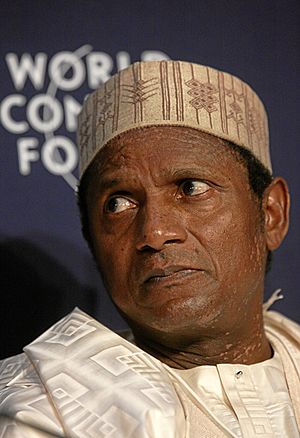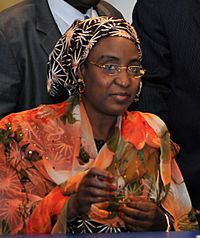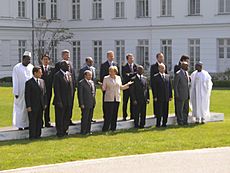Umaru Musa Yar'Adua facts for kids
Quick facts for kids
Umaru Musa Yar'Adua
|
|
|---|---|
 |
|
| 13th President of Nigeria | |
| In office 29 May 2007 – 5 May 2010 |
|
| Vice President | Goodluck Jonathan |
| Preceded by | Olusegun Obasanjo |
| Succeeded by | Goodluck Jonathan |
| Governor of Katsina | |
| In office 29 May 1999 – 29 May 2007 |
|
| Preceded by | Joseph Akaagerger (Military) |
| Succeeded by | Ibrahim Shema |
| Personal details | |
| Born | 16 August 1951 Katsina, Northern Region, British Nigeria (now Katsina, Nigeria) |
| Died | 5 May 2010 (aged 58) Aso Villa, Abuja, Nigeria |
| Political party | Peoples Democratic Party (1998–2010) |
| Other political affiliations |
Peoples Redemption Party (1979–1983) Peoples Front of Nigeria (1988–1989) Social Democratic Party (1989–1998) |
| Spouses |
Turai Yar'Adua
(m. 1975)Hauwa Radda
(m. 1992–1997) |
| Relations | Musa Yar'Adua (father) Shehu Musa Yar'Adua (brother) |
| Children | 9 |
| Alma mater | Barewa College Ahmadu Bello University |
Umaru Musa Yar'Adua (born August 16, 1951 – died May 5, 2010) was a Nigerian politician. He served as the President of Nigeria from 2007 until his death in 2010. He won the presidential election on April 21, 2007, and became president on May 29, 2007.
Before becoming president, Yar'Adua was the governor of Katsina state from 1999 to 2007. He was a member of the Peoples Democratic Party (PDP). In 2009, he traveled to Saudi Arabia for medical treatment. He returned to Nigeria in February 2010 but passed away in May of the same year.
Contents
Early Life and Family

Umaru Yar'Adua was born in Katsina state, Nigeria. His father, Musa Yar'Adua, was a government minister in the early days of Nigeria's independence. His father also held a special traditional title called Matawalle of the Katsina Emirate, which Umaru later inherited. This title means he was in charge of the royal treasury.
Umaru Yar'Adua married Turai Umaru Yar'Adua in 1975. They had seven children together: five daughters and two sons. Some of his daughters married important political figures. For example, his daughter Zainab married a former governor of Kebbi state. Another daughter, Nafisa, married a former governor of Bauchi state. His daughter Maryam married a former governor of Katsina state. Yar'Adua was also married to Hauwa Umar Radda from 1992 to 1997, and they had two children.
Education Journey
Umaru Yar'Adua began his schooling at Rafukka Primary School in 1958. He then went to Dutsinma Boarding Primary School in 1962. From 1965 to 1969, he attended Government College in Keffi. In 1971, he earned a Higher School Certificate from Barewa College.
He studied at Ahmadu Bello University in Zaria from 1972 to 1975. There, he earned a bachelor's degree in Education and Chemistry. He returned to the university in 1978 to get his master's degree in Analytical Chemistry.
Before Becoming President
Umaru Yar'Adua's first job was at Holy Child College in Lagos from 1975 to 1976. He then worked as a lecturer at the College of Arts, Science, and Technology in Zaria, Kaduna state, from 1976 to 1979. He continued lecturing until 1983, when he started working in the business world.
From 1983 to 1989, Yar'Adua was the General Manager of Sambo Farms Ltd. in Funtua, Katsina state. He also served on the boards of several companies and organizations. For example, he was a board member of Katsina State Farmers' Supply Company and a director of Habib Nigeria Bank Ltd. He was also the Chairman of Nation House Press Ltd. from 1995 to 1999.
Political Involvement
During Nigeria's Second Republic (1979–1983), Yar'Adua was a member of the People's Redemption Party. Later, he helped start the Peoples Front of Nigeria, a political group led by his older brother, Shehu Musa Yar'Adua. This group later became part of the Social Democratic Party. Yar'Adua was a member of the group that wrote the Nigerian constitution in 1988. He also served as the Social Democratic Party's State Secretary in Katsina. In 1991, he ran for governor but did not win.
Serving as Governor of Katsina
In 1999, Umaru Yar'Adua won the election to become the governor of Katsina state. He was the first Nigerian governor to publicly share details of his personal wealth. This was done to encourage honesty and fight corruption.
During his time as governor, Katsina state saw many improvements. Education was a top priority, and many new schools were built. Yar'Adua also worked hard to make the government run smoothly and reduce corruption. In 2003, he was re-elected for a second term.
The 2007 Presidential Election
In December 2006, Yar'Adua was chosen as the presidential candidate for the ruling People's Democratic Party. He received many votes from party members. His success was partly due to the support of the president at the time, Olusegun Obasanjo. Some people thought Yar'Adua was not well-known enough to win without this support. However, others noted that he was one of the few governors with a clean record, free from corruption accusations.
Soon after his nomination, Yar'Adua chose Goodluck Jonathan, who was the governor of Bayelsa state, to be his running mate as vice-presidential candidate. In the presidential election on April 21, 2007, Yar'Adua won with about 70% of the votes. However, this election was very controversial. Many observers and opposition candidates felt that the results were not fair.
Becoming President of Nigeria
After winning the election, Yar'Adua suggested forming a government that included different political parties. By June 2007, two opposition parties agreed to join his government.
Forming a Cabinet
Yar'Adua's new cabinet, which is a group of top government ministers, was sworn in on July 26, 2007. It included 39 ministers, with some coming from the opposition parties.
National Goals
In August 2007, Yar'Adua's government announced a "seven-point agenda." This plan was meant to help Nigeria solve its development problems and become one of the world's twenty largest economies by 2020. The main points of this plan included:
- Improving infrastructure, power, and energy
- Ensuring food security
- Creating wealth
- Improving transportation
- Reforming land ownership
- Boosting security
- Improving education
Unfortunately, due to his illness and eventual death, his government could not fully achieve these goals. For example, the power sector did not get enough funding, and problems with land laws made reforms difficult.
Changes to Elections
Umaru Yar'Adua set up a special committee to study how elections were held in Nigeria. This committee looked at legal, social, political, and security issues that affected how fair and trustworthy elections were. They also made suggestions on how to make elections better.
The committee was led by Mohammed Uwais, a former Chief Justice of the Supreme Court. Some of their suggestions included making the INEC (the body that runs elections) truly independent. They also suggested creating new agencies to handle some of INEC's tasks, like registering political parties. Another important suggestion was to quickly resolve any legal challenges to election results, ideally before the winner is sworn into office.
President Yar'Adua's Illness
President Yar'Adua left Nigeria on November 23, 2009, to receive medical treatment in Saudi Arabia. He was suffering from a heart condition called pericarditis. He was not seen in public after this, and his long absence caused a lot of uncertainty in the government.
In January 2010, Nigeria's Supreme Court ruled that the government's cabinet had fourteen days to decide if Yar'Adua was "unable to perform his duties." The court also said that five doctors, including Yar'Adua's personal doctor, should give their opinion on his health.
Transfer of Power
On February 10, 2010, the Senate (part of Nigeria's parliament) used a special rule called the "doctrine of necessity" to transfer presidential powers to Vice President Goodluck Jonathan. This made Jonathan the Acting President, with all the powers of the president, until Yar'Adua got better. Some people thought this transfer of power was against the law, but others believed it was necessary to prevent instability in the country.
Personal Life and Health
In 2007, Umaru Yar'Adua, who had a kidney condition, challenged people who doubted his health to a game of squash. This was his way of trying to stop rumors about his health. However, on March 6, 2007, he was flown to Germany for medical reasons, which again fueled rumors. His spokesperson said it was due to stress and that Yar'Adua was fine and would soon return to his campaign.
Sharing His Wealth Details
On June 28, 2007, Yar'Adua publicly shared details of his assets (his wealth and property) from May. He was the first Nigerian president to do this. He had about ₦856 million (which was about US$5.8 million at the time) in assets, with about ₦19 million belonging to his wife. He also had some debts. He made this information public to keep a promise he made before the election and to encourage other Nigerian politicians to be honest and fight corruption.
Death and What Happened Next
On February 24, 2010, Yar'Adua returned to Abuja quietly. His health was still very unclear, and there were rumors that he was on a life support machine. Many important people in Nigeria had visited him during his illness, hoping he would recover.
Umaru Yar'Adua passed away on May 5, 2010, at the Aso Rock Presidential Villa. An Islamic burial ceremony took place on May 6 in his hometown of Katsina.
The Nigerian government declared a seven-day period of mourning. Acting President Goodluck Jonathan said that Nigeria had "lost the jewel on its crown." US President Barack Obama also sent his condolences, saying that Yar'Adua was "committed to creating lasting peace and prosperity within Nigeria's own borders."
See also
 In Spanish: Umaru Yar'Adua para niños
In Spanish: Umaru Yar'Adua para niños
- Shehu Musa Yar'Adua, his elder brother
- Olusegun Obasanjo
- Goodluck Jonathan
Images for kids
 | Janet Taylor Pickett |
 | Synthia Saint James |
 | Howardena Pindell |
 | Faith Ringgold |


